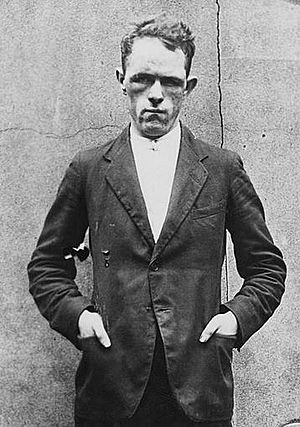Joseph O'Sullivan facts for kids
Quick facts for kids
Joseph O'Sullivan
|
|
|---|---|

O'Sullivan before his execution in 1922
|
|
| Personal details | |
| Born | 25 January 1897 London, UK |
| Died | 10 August 1922 (aged 25) |
| Resting place | Deans Grange Cemetery, County Dublin, Ireland. |
| Military service | |
| Branch/service | British Army Anti-Treaty IRA |
| Rank | Lance Corporal |
| Unit | Royal Munster Fusiliers London Regiment London IRA |
| Battles/wars | World War I |
Joseph O'Sullivan (born January 25, 1897 – died August 10, 1922) was an Irish man who lived in London. He is known for his involvement with the Irish Republican Army (IRA). On June 22, 1922, O'Sullivan and another IRA volunteer, Reginald Dunne, shot and killed Field Marshal Sir Henry Wilson. This happened outside Wilson's home in London.
O'Sullivan and Dunne were found guilty of the crime. They were sentenced to death. Many people, including the famous writer George Bernard Shaw, asked for them to be spared. However, O'Sullivan and Dunne were executed on August 10, 1922, at Wandsworth Prison. Their story later inspired the film Odd Man Out.
Contents
Joseph O'Sullivan's Early Life
Joseph O'Sullivan was born in London, England. His father, John, came from Bantry, County Cork, Ireland. John O'Sullivan moved to London and became a successful tailor. Joseph's mother, Mary Ann O'Sullivan, was born in Inniscarra, County Cork.
Joseph was the youngest of thirteen children. Eleven of his siblings lived to be adults. As a boy, he went to St Edmund's College, Ware school.
Serving in World War I
On his eighteenth birthday, January 25, 1915, Joseph O'Sullivan joined the army. He first joined the Royal Munster Fusiliers. Later, he moved to the London Regiment.
He fought as a lance corporal in World War I. In 1917, he was wounded at Ypres and lost one of his legs.
After the War
After leaving the army in 1918, O'Sullivan worked for the government. He first worked for the Ministry of Munitions. This department helped make weapons during the war.
When the war ended, he moved to the Ministry of Labour. He worked there as a messenger. This office was near Scotland Yard, a famous police headquarters.
Joining the IRA
Joseph O'Sullivan became a member of the IRA in London. The IRA was a group that wanted Ireland to be independent from Britain.
His brother, Patrick O'Sullivan, was also involved with the IRA. Patrick was a leader in the London IRA. He also fought in World War I and was wounded. Another brother, Aloysius, also served in the war.
Patrick O'Sullivan fought in the Anglo-Irish War and the Irish Civil War. He was wounded shortly after Joseph was executed. Patrick had tried to help his brother and Reginald Dunne escape from prison.
Reburial in Ireland
After Joseph O'Sullivan's death, his father tried to have his son's body returned to Ireland. This was not allowed at first.
Years later, after capital punishment was ended in the UK, his brother Patrick tried again. With help from the National Graves Association, the bodies of Joseph O'Sullivan and Reginald Dunne were finally sent to Ireland.
In 1967, after talks between the British and Irish governments, their bodies were moved. They were reburied in Deans Grange Cemetery, County Dublin, Ireland.
 | William M. Jackson |
 | Juan E. Gilbert |
 | Neil deGrasse Tyson |

